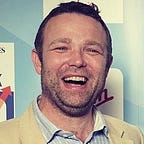Serve to Lead
“It’s getting better. Do some more work on it and let’s review the changes this afternoon”.
The first couple of times I heard Julie say this, I didn’t really pay attention. Sure. Of course I can rework it. By the time we reached the mid-teens on this redo-review dance for the same presentation deck, she lost faith in me fixing it by myself. So Julie hired in some top dollar communication consultants to get it back on track. By the mid-twenties I think she began to see the light at the end of the tunnel. By the mid-thirties we reached a landmark. The slides were worthy of presentation to Julie’s client. Not awesome. Not really great. Not even great. Just good enough.
Exigent. In a French accent. Exigence to product development has now, in the case for example of Steve Jobs and Apple, has become a modern business legend. In fashion and haute couture, we expect it. The Devil wore Prada. But in a technology services company? For a single, albeit important account? On a business park in Berkshire? Get outta here.
Julie saw, more vividly than anyone I’d met before, the human chain between the client’s business challenge, “My customers need to be able to make calls where we don’t have radio towers”, through the right message, the right image, and the right proposition, to a developer in India being able to fund extra lessons for his daughter, right back again to that customer finally getting a good connection. Her interest in doing right by the client all along that chain earned client trust and turned around one of HP’s most valuable business relationships.
“Serve to lead” is the motto of the British Army’s officer training college. Julie embodied servant leadership. She wanted to win. And above all, to win well. My default experience in big business has been working with people rather than working for them. Julie’s vision, ambition and commitment inspired people to work for her, rather than simply with her. And work I did. Many more hours than I was contracted to do so, and for thousands of hours in total. Multiply that across the hundreds of people working on Julie’s account. You can understand why her clients valued her so.
Julie invested in her team to the fullest extent that corporate policy allowed. And often, it seemed to me, beyond that. She was a constant reminder to me that people build businesses. She build a team that was both loyal to her and complimentary to her weaknesses. She was an educator in the fine old sense of the word. She held herself and her team, suppliers and her clients to high standards. Where she saw the flame of potential in an individual she cared about, she really worked hard to see it grow stronger.
Thank you Julie. Your energy and enthusiasm made our world a better place. What a great pity that you left so early. It was a privilege to have worked for you.
